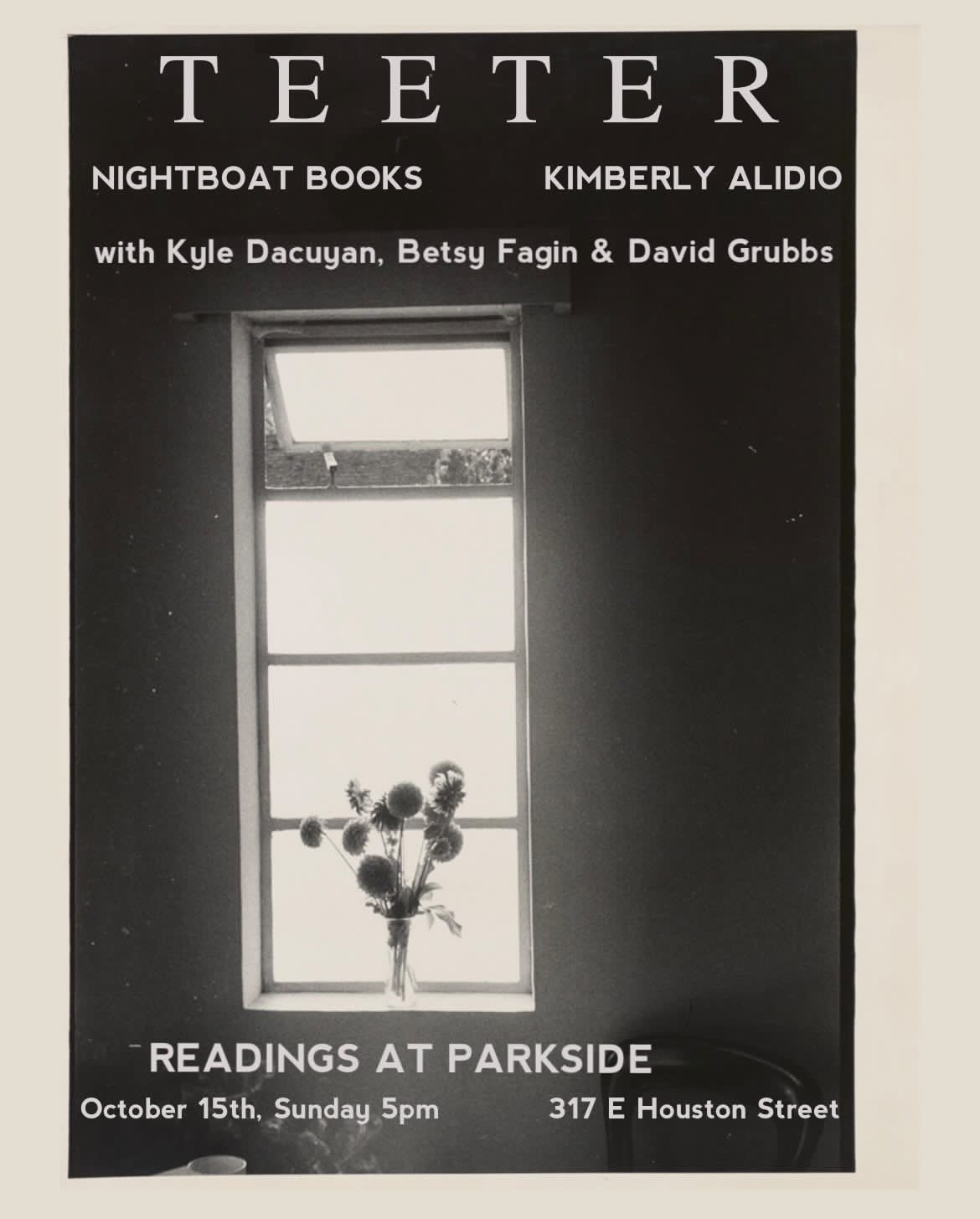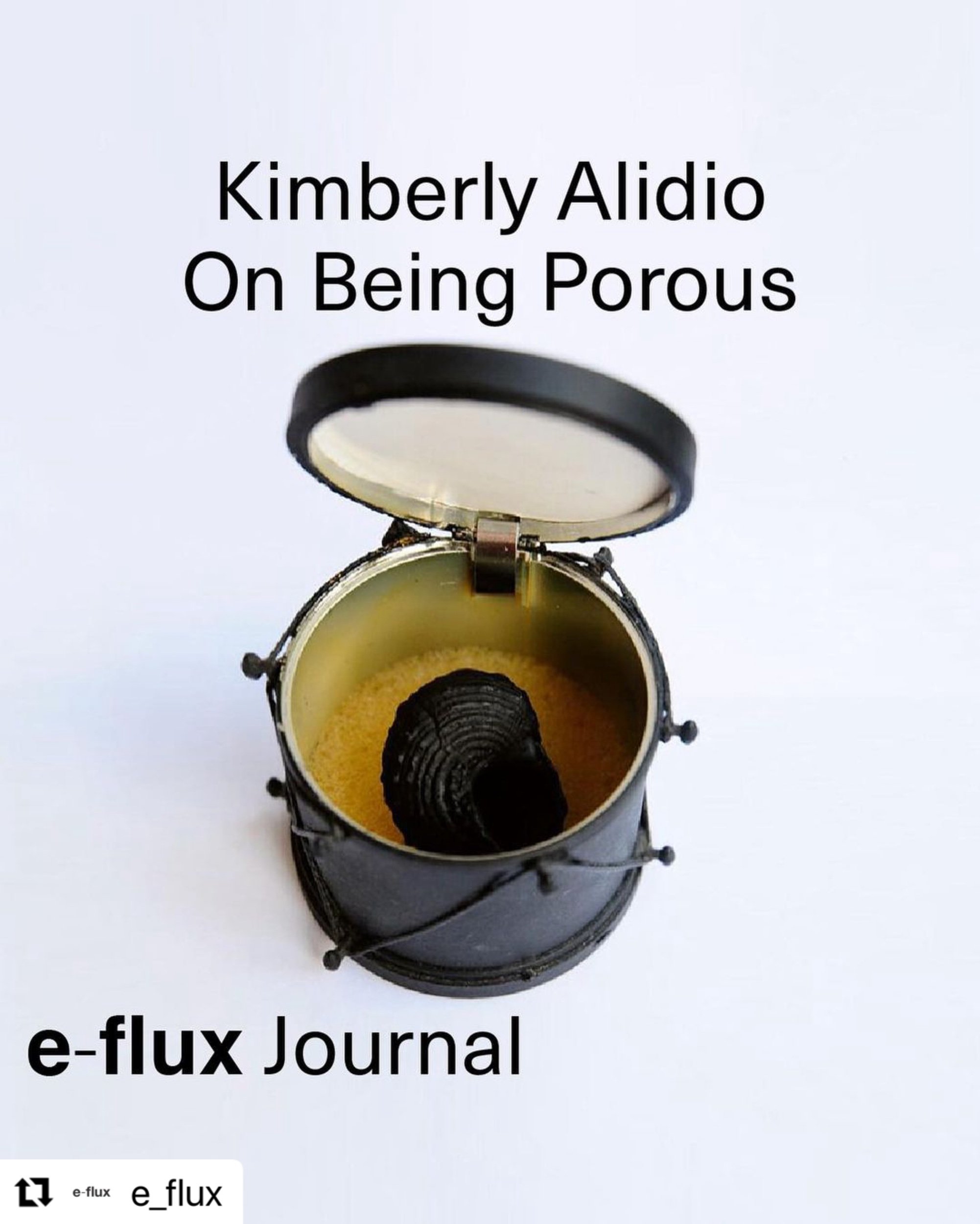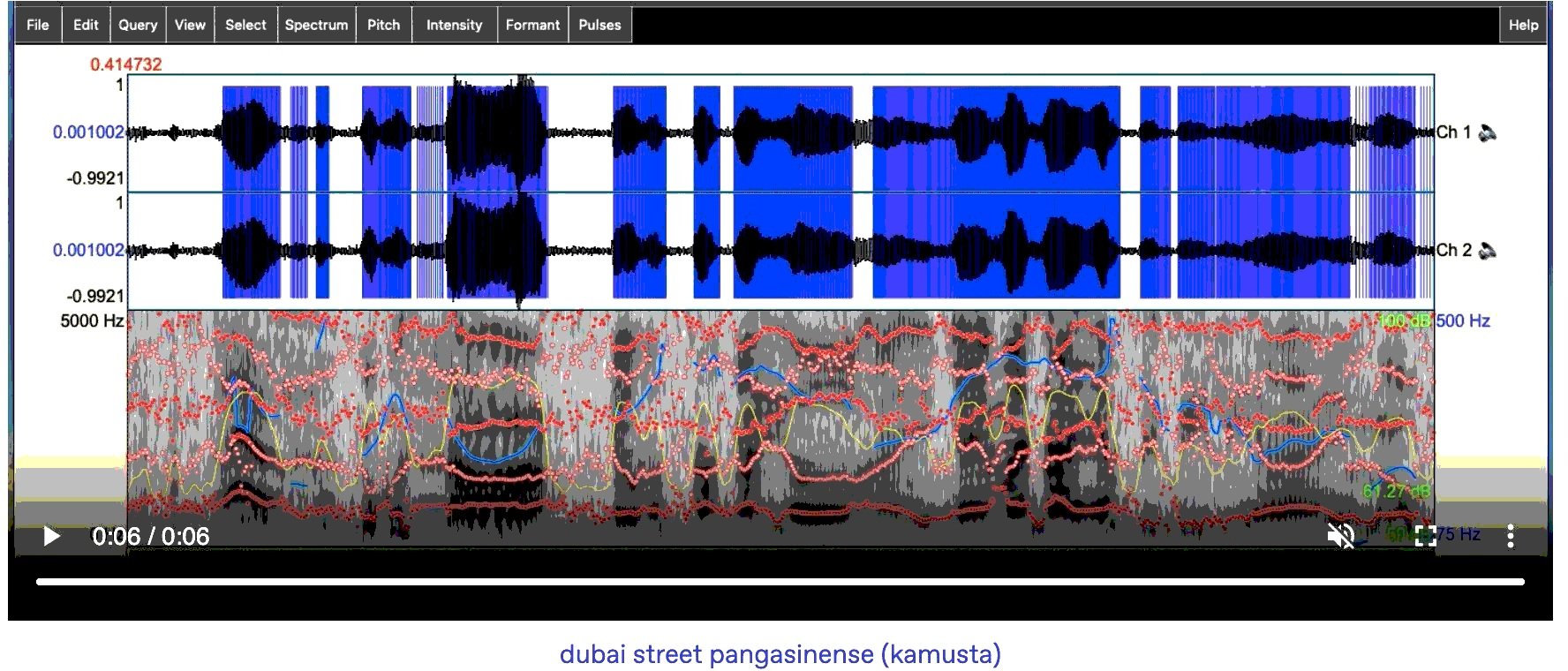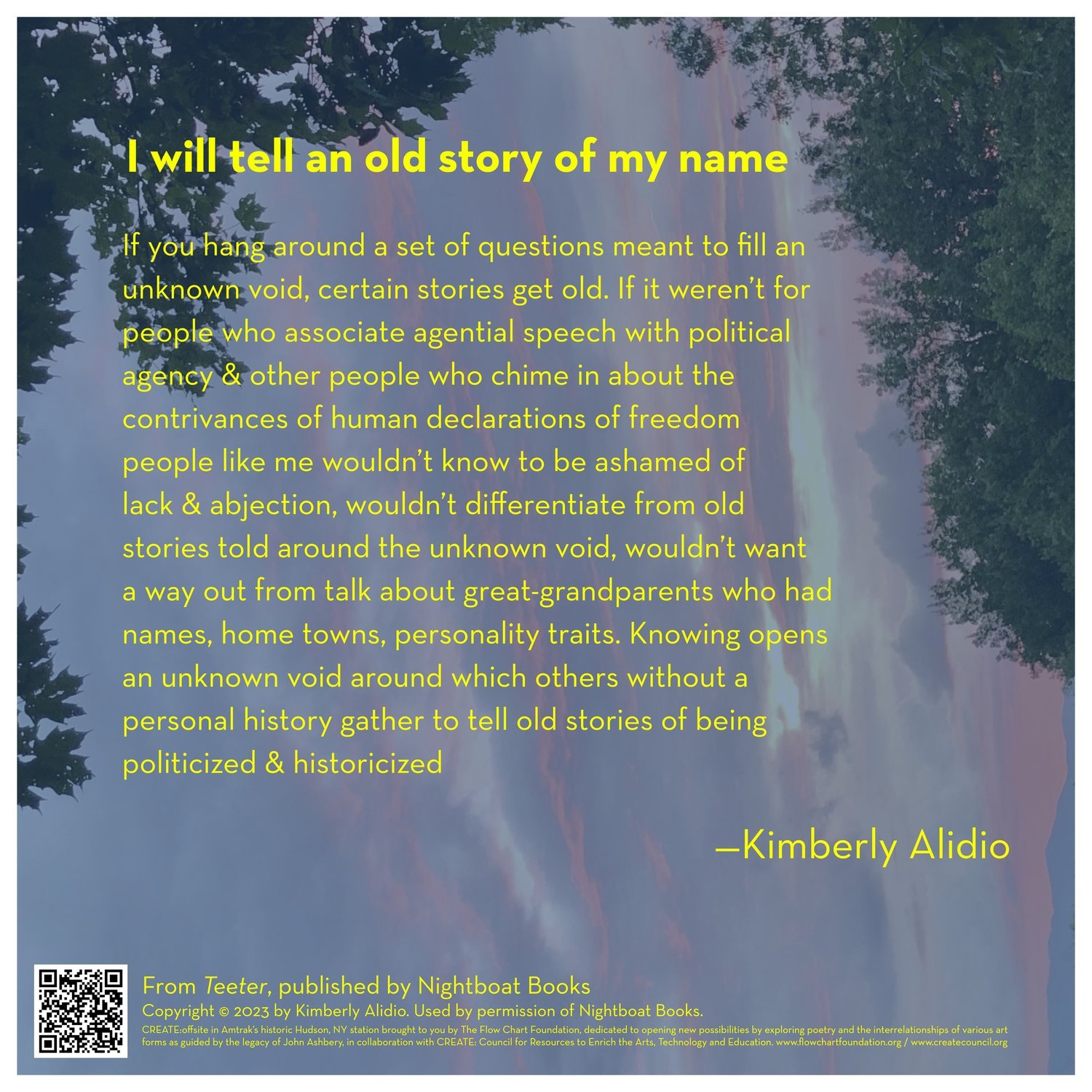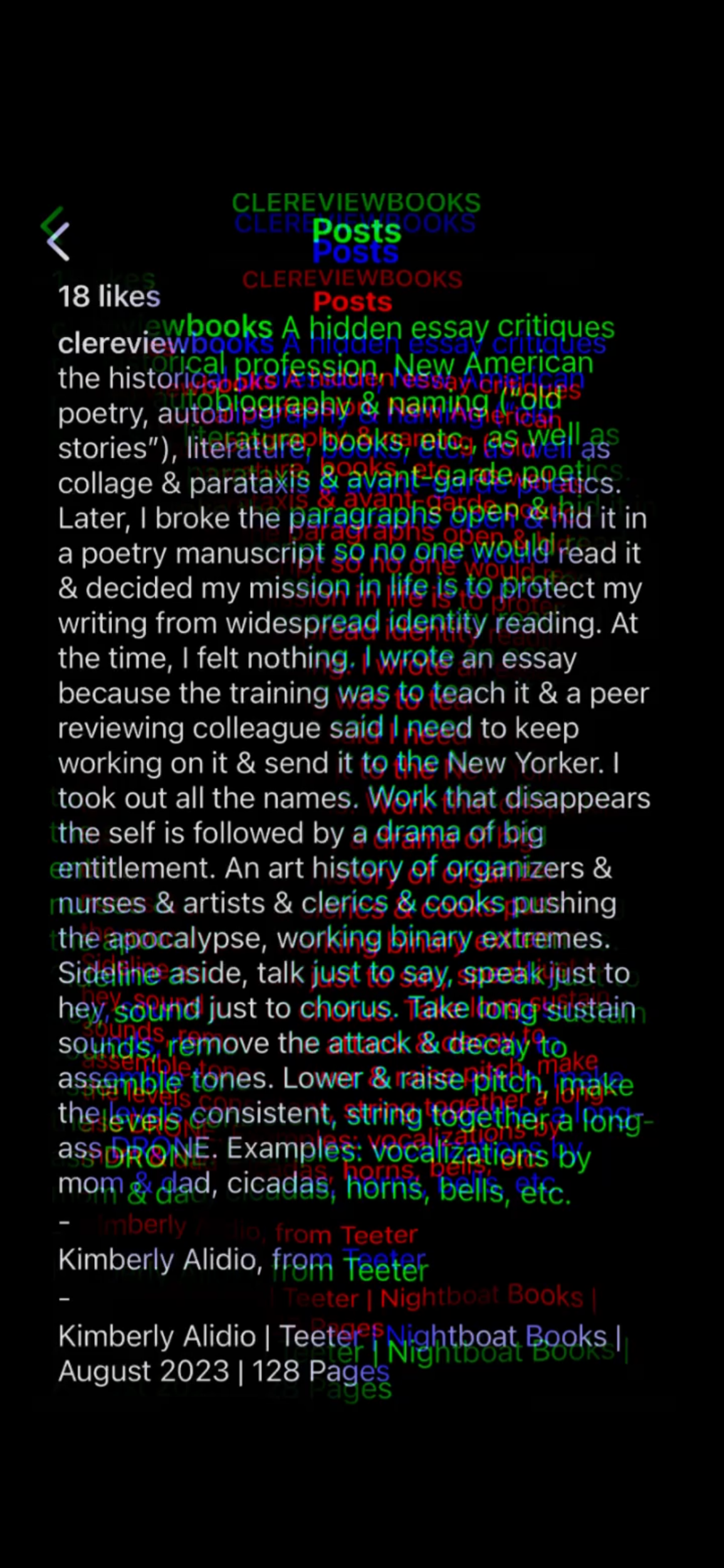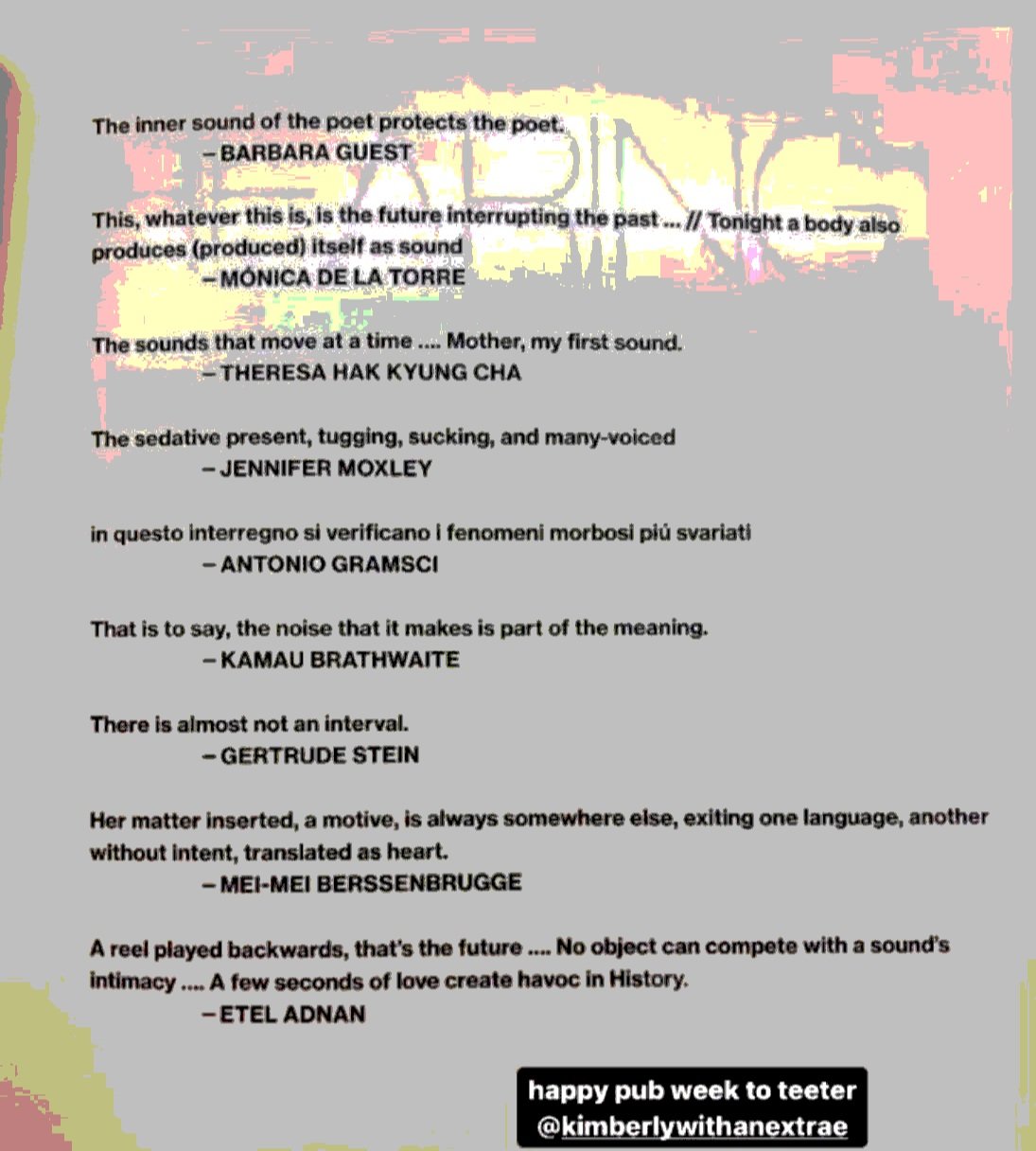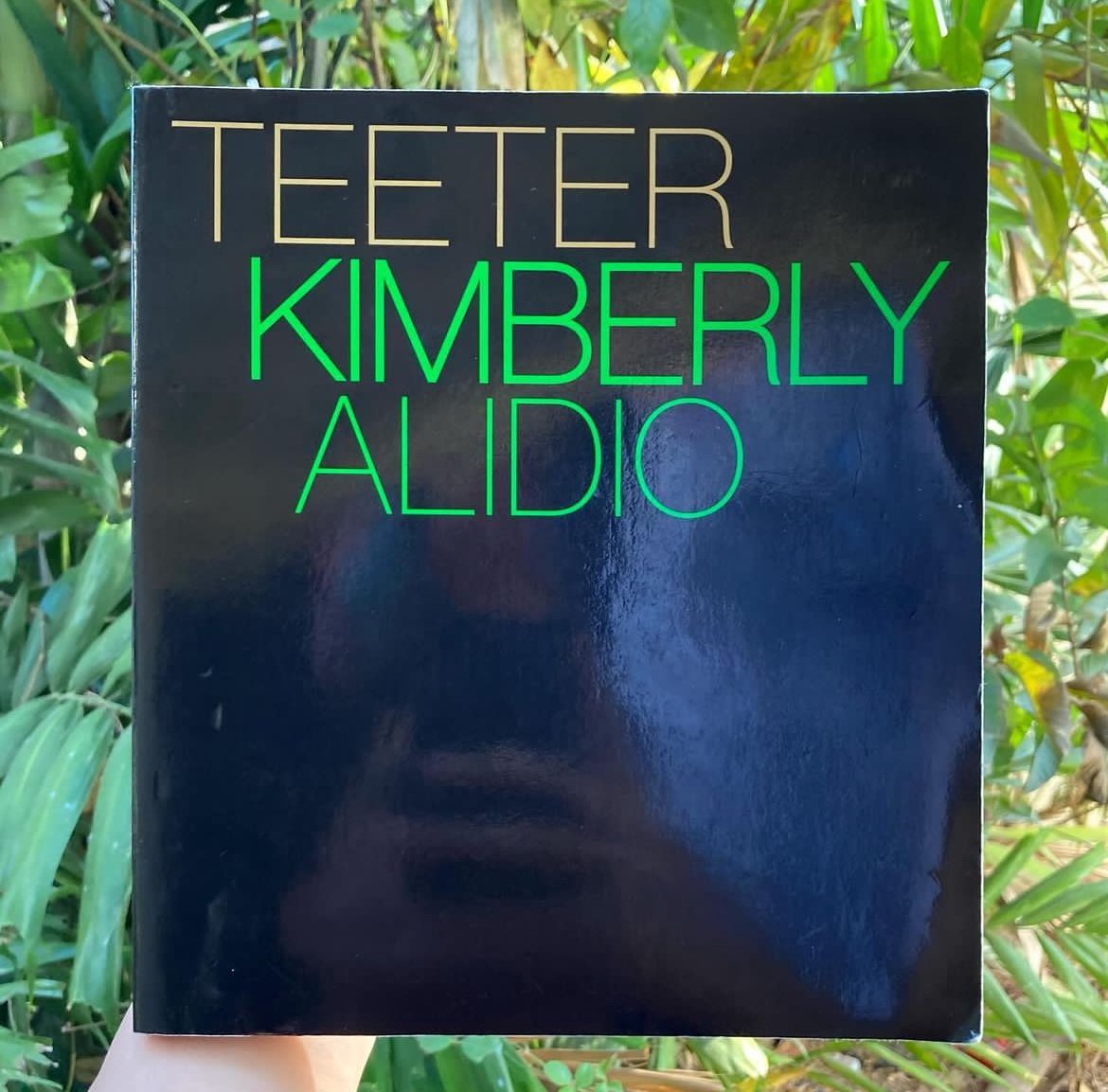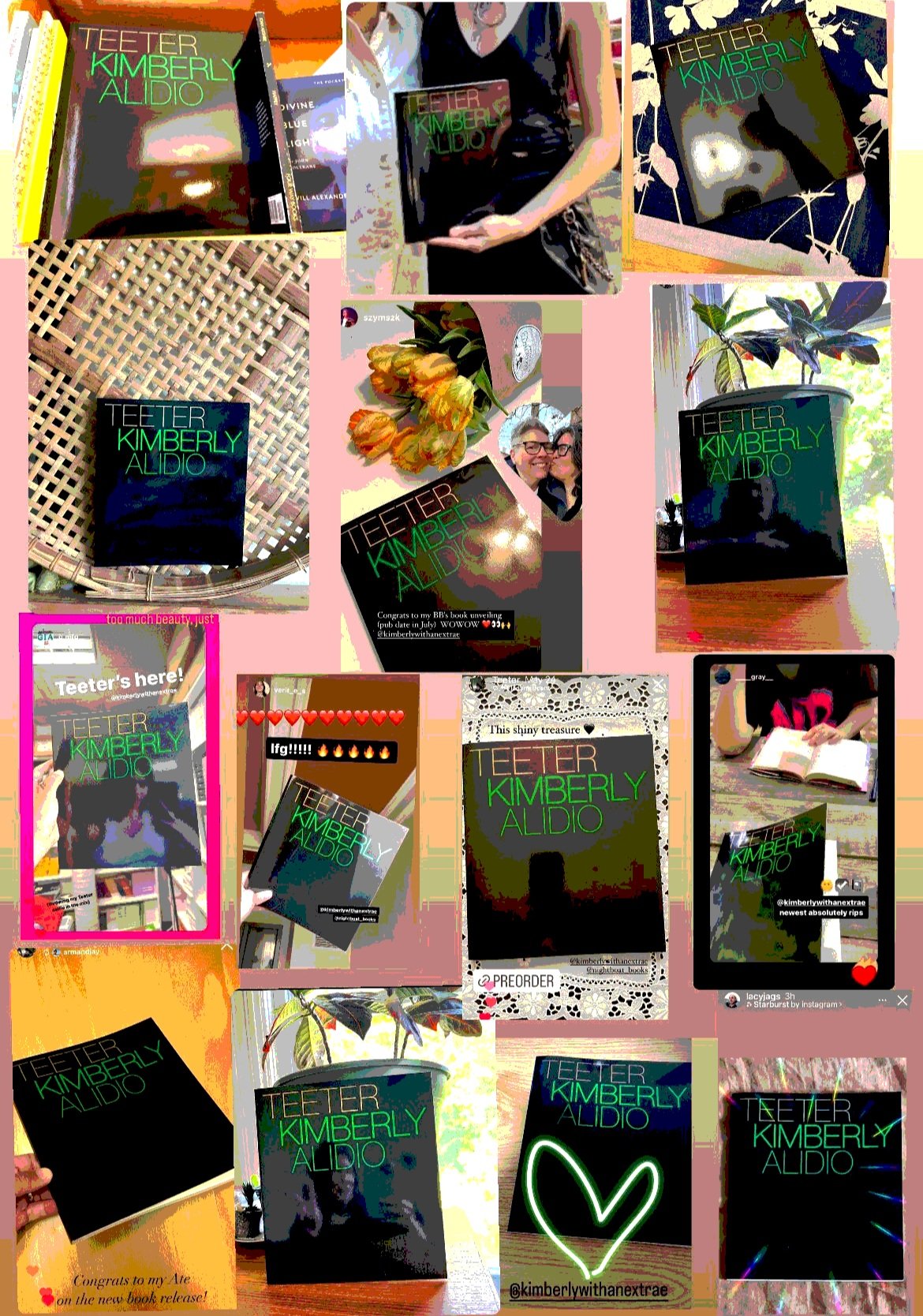Teeter
An autohistoriography of felt time that arises from subversive hearing practices and the emotional prosody of a mother tongue one does not understand but activates in another poetic language.
Comprised of three long poems, Teeter knows experimental forms can be as intimate as mothering; knows we can understand languages we do not speak. From “Hearing”s intensities of attention, to “Ambient Mom”’s familial Filipino immigrant soundscapes, to “Histories”s careful scrutiny of the socially-sanctioned narratives and trajectories to which we are meant to aspire, Teeter’s lessons in listening reverberate across career retrospectives and heritage languages, colonial histories and domestic intimacies, reattuning us to what we’ve neglected to notice in our efforts to create a life we can understand.
Winner of the Nightboat Poetry Prize
Praise
Across three disjunct long poems, Kimberly Alidio’s writing excels at “tracking flows in listening” and a subtle, subversive weighing of words. Whether as writerly reader, as student of Pangasinan language, or as collaborator-after-the-fact to sound works by Maryanne Amacher, Lea Bertucci, and others—not so distant from Fred Moten’s writing “with” Cecil Taylor—this marvelous book has everything to do with media and modes of interface beyond the book: “Diligence to enter the field of noise & employing all of the training of one’s ear, to be a co-presence / Overhearing as a way of being simultaneously.” —David Grubbs
This is such a physical book to read. Kimberly Alidio animates the tendons of utterance and draws my attention to speech as transubstantive. A vast listener in Teeter is opening us to counter-cartographic experience of place. Oceanic and archipelagic feeling regards the ancestral and the future without any will to claim or circumscribe. I feel ecstatic reading these poems. Deeply in my body, beyond it, the rangy freedom of perceiving, remembering what trace we are of one another. —Kyle Dacuyan
The sonic realm is this brilliant book’s polestar precisely because of its ongoingness and intimacy: a “pure affirmation that doesn’t affirm anything” (Ashbery). A powerful instrument against thought’s instrumentalization is voice — both as material inscription and event produced by a body, here in defiance of English’s hegemony. A poem’s speaker wonders about the possibility of “thinking & being in some kind of open conspiracy to persist in thinking & being.” Teeter offers an answer, and I couldn’t agree more with the interlocutor whose reply is, “I love poets, I hate celebrities.” —Mónica de la Torre
Conversations
Specific Objects: Talks on Arts in the Catskills Podcast, hosted by Miriam Atkin + broadcast on WGXC-90.7 FM | Wave Farm, Acra, NY
“On Being Porous.” e-flux Journal Issue #144, April 2024 [pdf].
“Kimberly Alidio with Irene Hsu.” The Brooklyn Rail, December 2023/ January 2024 [pdf].
“Kimberly Alidio’s Playlist for Their Book, Teeter,” Largehearted Boy [pdf].
“An Interview with Kimberly Alidio, Author of Teeter, with Gia Gonzales.” Nightboat Books [pdf].
Stella-Ann Harris & Cassandra Bristow, “‘prosodies they have no mastery over’: A Conversation with Belladonna* Author Kimberly Alidio.” Air/Light Magazine [pdf].
Reviews
Alidio pays close attention to sounds and utterance, and how inseparable they are to languages and histories, along with places and politics. It is a very physical/visual act of reading as the wide pages provide a lot of room for the poems to breathe, especially the second section. What is heard is a pathway to rethink the empire and the homeland, and the entanglements they carry, though in different terms. This is not some individualist/liberal/l-am-above-all-these position, but rather a critical stance on several fronts exploring the intimacy of soundscapes and how it outlines the dismantling of hegemonies.—Eric Abalajon, Jacob Laneria
Teeter’s capacious brilliance brings to light a poetics of friction that teaches us that language is also a site of struggle, noncompliance, humor, and beauty. The stakes are high and infused with a kind of phonemic magic. Language is material and transforms materiality.… Teeter torques utterance into a revolution, a turning, a disordering of value on every conceivable level—semantic, syntactic, sonic. Alidio awakens us to how forms of colonial, cisheteronormative, and capitalistic valuation seep into the semantic value of sonic transmission. Between breath and speech, between phoneme and grammar, between lovers and haters, Alidio plots out the frequencies that are able to value and sustain an “art dyke / genderqueer life.” Their portaling poetics unmake and remake a world through the collaborative activity of language. —Rebecca Teich, Los Angeles Review of Books [pdf]
Through mixing, collaging, and looping, these poems become vehicles for both embodiment and investigation of the subject: sound—as music, as language, as simultaneously instinctive and cultural-political. Alidio adds a brief matrilineal family tree and a graphic highlighting anlong, the Pangasinan word for poetry; both inherence and making are key to this project. This book is not just a collection of noise, but a move toward reframing what exactly experimental poetry is “over time.” —Rebecca Morgan Frank, Poetry Foundation [pdf]
This work is expansive and experimental, including a cluster of “Autohistoriography” poems in the third section, which suggest a furthering of what Fred Wah once coined as “bio-text,” employing a life-writing, but one propelled, first and foremost, by language, in both cadence and purpose, and one that seems to incorporate elements of the lyric journal, whether the late American poet Bernadette Mayer, a poet referenced within, or the journal-lyric of Alidio’s partner, Stacy Szymaszek. There is a durational feel to this particular work, at least one of a sense of ongoing thinking, or ongoingness —rob mclennan [pdf]
[Alidio's] work, pedagogic and poetic, is that of a dexterous maker and attuned hearer. Teeter, her fourth full-length poetry book, marks the apex of a language poet’s work, where making occurs alongside documenting but does not extract from it and in which hearing surrounds language but does not acquire, master, or own it. … By refusing such “morbid transactions,” Teeter asks an openness of the reader, encouraging me to “find [my] own way to read, to order, to establish relation between units of language.” This is not a lecture, but a dance. I thank Kimberly Alidio for Teeter, a book that moves me to keep making and unmaking. —Gray Agpalo, Apogee [pdf]
Introductions + Commentary
Such a luminous book! And the physicality of it is impeccable—it demands for language to be felt, held, cradled. Reading it reminded me of a series of references, which I always take as a sign of strong writing. From musician Maria Chávez's "impossible nature walks" that mix together field recordings from disparate reaches of the globe; the transrational language zaum—begotten by the anarchist Gordin brothers during Russia's revolutionary period—that dictated that language should appeal first and foremost sonically rather than rationally or linguistically; Mirene Arsanios' embodied writing on mother tongues; to artist Xin Shen's film/installation chronicling her investigation into learning her ancestral Tibetan. Also, curiously, I was thinking a lot about how Yvonne Rainer storyboarded her films by drawing a line to bisect a page vertically, with one resulting column devoted to image and the other to text. These references probably already sit as various nodes within your own matrix, but I was compelled to share the extent to which your book felt like another, further opening or gathering, immediately situated within such a vast legacy. —Hallie Ayres, e-flux
“Do we belong to one another when languages are at work and at play without understanding or interpretation?” The author’s varied experiences with Tagalog and Pangasinan, poetry, family, and the body make the answer elusive but vital. —Aimee Nezhukumatathil, The Bill Waller Award in Creative Nonfiction
Teeter leverages the nuances of speech and sound to expansive results in its three long poems. —David Gutowski, Largehearted Boy [pdf]
To love poetry is to be cool with these invertebrate moments, with not always understanding, with resurrecting the child, for whom the world is thrilling because it is sometimes baffling. In her poem, Kimberly Alidio invites us to go looking for the child: ‘In my poem, an abstraction of my voice, you may search out my childhood hearing.” —Rainer Diana Hamilton, Washington Post [pdf]
I’m so grateful for all Teeter has taught me. I feel cracked open by it. There’s so much I responded to with an immediate and visceral sense of recognition—so much which reflects, in both context and sound, the Filipino-American diasporic experience—and in this way, Teeter also guides me towards new understanding about my relationship to language and my own poetic practice; an understanding I’d previously only known intuitively. Like Kimberly, like many other Filipino Americans, I was raised monolingual in a multilingual household. For Kimberly, those languages are Filipino and Pangasinan, for myself, Filipino and Ilocano. I read Teeter and I’m flung back into old memories: the dark, tense, staticky hush of gossip in languages whose contours I can only begin to understand, a sudden moment of clarity coalescing around the call to the dinner table. What subversive potentials, what intimacies of body and feeling does listening promise? How can expanded forms of listening come to bear on the way we orient our lives—re-attuning ourselves to the pleasures and possibilities of relationships and encounters rendered indecipherable under capitalism?
What I love about Teeter is its generosity, the palpable sense of excitement in its invitation to us to join in this exercise. When I say intimacies of body and feeling I mean this—that what constitutes speech is an intricate and minute coordination of muscle and breath that originate in one’s throat and mouth and produce a wave which coaxes the ear of another to vibrate in response. And I think, too, of a quote by the composer Erik Satie—arguably a progenitor of ambient music—who once expressed a desire to “bring about a music … which would fill up those heavy silences that sometimes fall between friends dining together. It would spare them the trouble of paying attention to their own banal remarks. And at the same time it would neutralize the street noises which so indiscreetly enter into the play of conversation. To make such a noise would respond to need.” Ambience, Teeter demonstrates for us, can be a form of mothering. In an email to me, Kimberly writes: "I just want our (yes, deliberately “our”) experience of languages to be as beautifully weird as Language Poetry is, at least to me." —Gia Gonzales, Segue Reading Series

